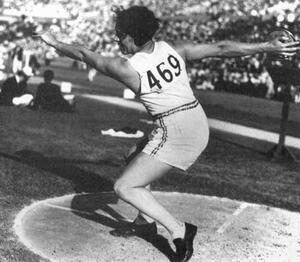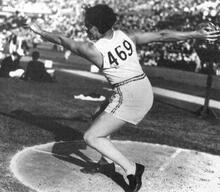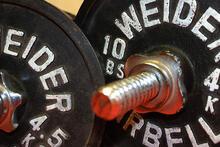Lillian Copeland
This photo was taken during the 1930s, the decade in which all-round athlete Lillian Copeland (1904 – 1964) both won an Olympic gold medal—in the 1932 Los Angeles Olympics—and was one of the many athletes to boycott the Olympic Games that were held in Berlin in 1936.
Institution: United States Library of Congress.
Lillian Copeland was the epitome of a strong woman with a remarkable career, first as a record-setting Olympic medalist and later as an officer in the Los Angeles Sheriff’s Department. Copeland was a four-time national shot-put champion before setting world records at the 1928 Olympic trials. She went on to win gold in the discus throw at the 1932 Olympics, setting a new world record. She won the triple championship for discus throw, javelin throw, and shot put at the 1935 World Maccabiah Games, her last competition, but boycotted the 1936 Berlin Olympics a year later. The boycott marked her retirement from sports; in 1936 she joined the Los Angeles Sheriff’s Department, retiring in 1960.
Article
Lillian Copeland was one of the greatest overall woman athletes in the mid-1920s. Born in New York City on November 25, 1904, she was the daughter of Minnie Drasnin, a housewife, from Grodno, Poland. She was also raised by her stepfather, Abraham Copeland, the manager of a produce company, after the death of her father. She attended Los Angeles High School.
In 1926, Copeland held National Amateur Athletic Union championships in shot put, discus throw, and javelin throw, as well as world records for the discus and javelin throws. Copeland won every woman’s track event that she entered while at the University of Southern California in the late 1920s.
A four-time national champion in the shot put, Lillian Copeland switched to the discus throw (since the shot put was not yet an Olympic event), setting a new world record at the 1928 Olympic trials. At these trials, she also ran the lead-off leg on the United States 400-meter relay team that set a new world record. Copeland went on to become one of the first women to win an Olympic medal (silver), for the discus throw.
Lillian Copeland received a BA degree in political science in 1930 and then curtailed her track activities to attend USC Law School. In 1931, she returned to competition and won national championships in both the shot put and the javelin throw. Copeland decided to concentrate on the discus throw for the 1932 Los Angeles Olympics. She placed third in the trials and sixth going into the finals. Nonetheless, a reporter for the Los Angeles Record stated, “Confident, calm and perfectly poised, [she] made a perfect throw.” For this effort Copeland won a gold medal and set new Olympic and world’s records (133 feet, 15/8 inches). Ruth Osburn, the teammate whose new discus-throw world record was eclipsed within a half hour by Copeland, graciously said, “She’s been a great star for a long time and she deserves to be an Olympic champion.”
After attending the University of Southern California Law School through the spring semester of 1934, Copeland traveled to the 1935 World Maccabiah Games in Tel Aviv, where she won the triple championship in the discus throw, javelin throw, and shot put. This was her last public appearance, since Copeland was one of many Olympic athletes who boycotted the 1936 Berlin Olympics.
Lillian Copeland joined the Los Angeles County Sheriff’s Department in 1936 and worked there until her retirement in 1960. Her service included sixteen years as a Juvenile Bureau sergeant at the Firestone and Lennox stations. Copeland qualified as an expert marksman in 1938, scoring 274 points out of a possible 300 in a sheriff’s department competition. She died in Los Angeles on July 7, 1964, following a long illness.
Lillian Copeland identified herself as a Jewish athlete when she paid her own way to attend the Second Maccabiah Games. And, in turn, Copeland was inducted into both the International Jewish Sports Hall of Fame in Netanyah, Israel (1980), and the Southern California Jewish Sports Hall of Fame in Los Angeles (1991).
Babcock, Muriel. “Lillian Copeland Closes Athletic Career in Glory.” Los Angeles Times, August 3, 1932: 12.
BEOAJ; Drasnin, Bob [cousin of Lillian Copeland]. Interview by author, January 1997; Frank, Stanley B. The Jew in Sports (1936).
Gagnon, Cappy. “1932 Olympic Star Has Star in Her Future.” Newsletter of the Los Angeles County Sheriff’s Department (c. 1985).
Hanley, Reid M. Who’s Who in Track and Field (1973).
Hoffman, David [Registrar of the USC Law School]. Interview by author, August 8, 1996.
Huston, Ralph. “World’s Champion Half-Hour.” Los Angeles Times, August 3, 1932: 9, 12; Obituary. NYTimes, July 8, 1964, 35:1.
Postal, Bernard. Encyclopedia of Jews in Sports (1955).
Siegman, Joseph. The International Jewish Sports Hall of Fame (1992).
Slater, Robert. Great Jews in Sports (1983), and “U.S. Olympic Star Copeland Dies at 60.” Los Angeles Times, July 8, 1964.
UJE.





